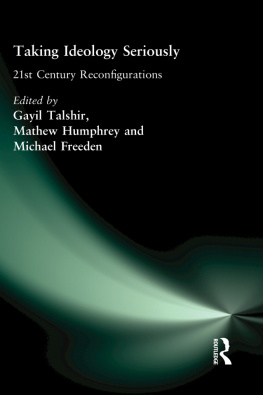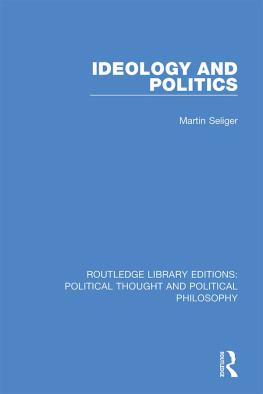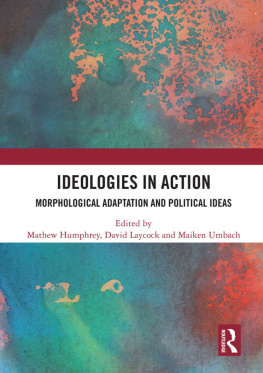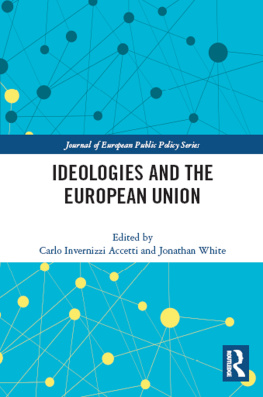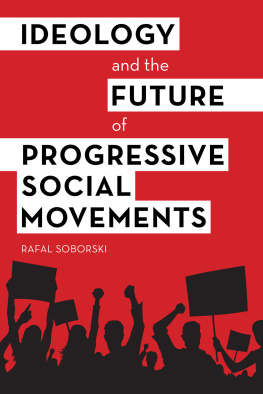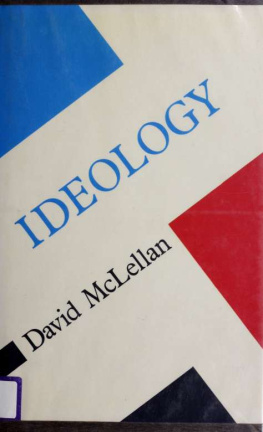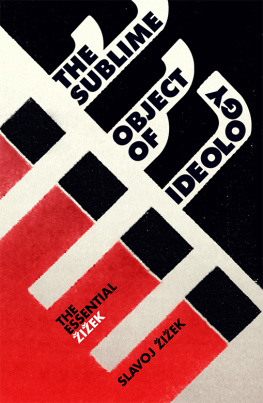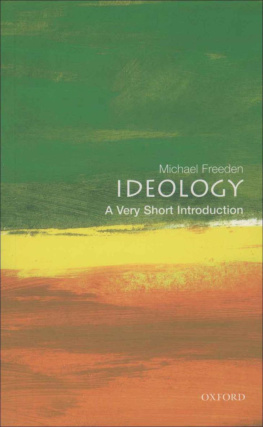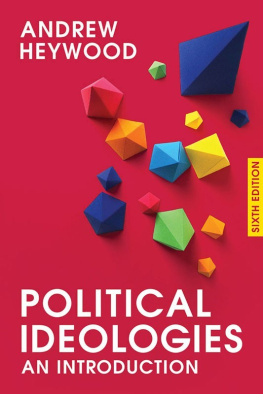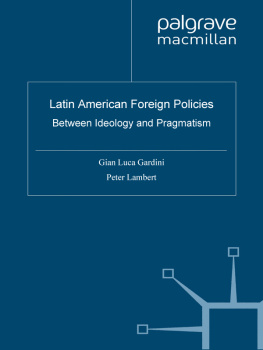Taking Ideology Seriously
Recent years have witnessed a resurgence of the end of ideology thesis, not as a theoretical stance but as a reaction to what appears to have been the decline of major ideological families, such as socialism, in a changing world order. Globalization, as well as internal national fragmentation of belief systems, have made it difficult to identify ideology in its conventional formats.
This volume challenges the notion that we are living in a post-ideological age. It offers a theoretical framework for exploring some of the new manifestations of ideologies, and combines this with a series of case-studies relating to recent ideational phenomena, such as populism, environmentalism and Islamic fundamentalism. It reassesses some typologies, such as the left-right axis, as an explanatory device.
This volume is unique in using ideology research to bring together different scholarly perspectives including party-political analysis, the history of ideas, postmarxism, and movement politics.
The purpose of the essays is to revitalize the scholarly understanding of ideology as central to the concerns of political science. Recent political movements are reinterpreted through using new approaches to the analysis of ideology. In so doing we seek to bridge the gap between empirical and theoretical research in the field.
This book was previously published as a special issue of The Critical Review of International Social and Political Philosophy .
Gayil Talshir is a lecturer and the head of the Graduate Programme in Citizenship and Democracy, in the Department of Political Science, the Hebrew University of Jerusalem, Israel.
Mathew Humprey is Senior Lecturer in Politics at the University of Nottingham.
Michael Freeden is Professor of Politics and Director of the Centre for Political Ideologies at the University of Oxford, Professorial Fellow at Mansfield College, Oxford, and ESRC Professorial Fellow 20042007.
Taking Ideology Seriously
21st Century Reconfigurations
Edited by Gayil Talshir, Mathew Humphrey and Michael Freeden
First published 2006 by Routledge
2 Park Square, Milton Park, Abingdon, Oxon, OX14 4RN
Simultaneously published in the USA and Canada by Routledge
270 Madison Ave, New York, NY 10016
Routledge is an imprint of the Taylor & Francis Group
2006 Taylor & Francis Group Ltd
Typeset in Times by Genesis Typesetting Ltd, Rochester, Kent
Printed and bound in Great Britain by Antony Rowe Ltd, Chippenham, Wiltshire
All rights reserved. No part of this book may be reprinted or reproduced or utilised in any form or any electronic, mechanical, or other means, now known or hereafter inveted, including photocopying and recording, or in any information storage or retrieval system, without permission in writing from the publishers.
British Library Cataloguing in Publication Data
A catalogue record for this book is available from the British Library
Library of Congress Cataloging in Publication Data
A catalog record for this book has been requested.
ISBN10: 0-415-36678-X (cased)
ISBN13: 978-0-415-36678-6 (cased)
Gary K. Browning is Professor of Politics at Oxford Brookes University. He is the author of Plato and Hegel; Two Modes of Philosophising About Politics (Garland, 1991), Hegel and the History of Political Philosophy (Macmillan, 1999), Lyotard and the End of Grand Narratives (UWP, 2000) and Rethinking R.G. Collingwood: Philosophy, Politics and the Unity of Theory and Practice (Palgrave, 2004). He has co-edited and co-written other works, including Understanding Contemporary Society: Theories of the Present (Sage, 2000). He is co-editor of the journal, Contemporary Political Theory (Palgrave/Macmillan) and is currently completing a book on political economy.
Torben Bech Dyrberg is Lecturer in the Department of Social Sciences, Roskilde University, Denmark. Recent publications include Right/left in the context of new political frontiers: Whats radical politics today?, Journal of Language and Politics , 2(2), 2003, pp. 333361; (with Henrik Paul Bang) Governing at close range: demo-elites and laypeople, in Henrik Paul Bang (Ed.), Governance as Social and Political Communication (Manchester University Press, 2003), pp. 221240; The political and politics in discourse analysis, in Simon Critchley (Ed.), Laclau: A Critical Reader (Routledge, 2004), pp. 241255.
Michael Freeden is Professor of Politics and Director of the Centre for Political Ideologies at the University of Oxford, Professorial Fellow at Mansfield College, Oxford, and ESRC Professorial Fellow 20042007. Among his books are The New Liberalism: An Ideology of Social Reform (Clarendon Press, 1978); Liberalism Divided: A Study in British Political Thought 19141939 (Clarendon Press, 1986); Rights (Open University Press, 1991); Ideologies and Political Theory: A Conceptual Approach (Clarendon Press, 1996); Reassessing Political Ideologies: The Durability of Dissent (Ed.) (Routledge, 2001); A Very Short Introduction to Ideology (Oxford University Press, 2003); Liberal Languages: Ideological Imaginations and 20th Century Progressive Thought (Princeton, 2005). He is the founder-editor of the Journal of Political Ideologies .
Jeffrey Haynes is Professor of Politics at London Metropolitan University, where he teaches courses on international relations. Recent articles and books include: Comparative politics and globalisation, European Political Science , 2(3), 2003; Tracing connections between comparative politics and globalisation, Third World Quarterly , 24(6), 2003; Religion and international relations: what are the issues?, International Politics , 41(3), 2004; Comparative Politics in a Globalizing World , 2005; Palgrave Advances in Development Studies , 2005.
Mathew Humphrey is Senior Lecturer in Politics at the University of Nottingham. His main area of research is in political theory and its relationship to environmental problems. Publications include Political Theory and the Environment: a Reassessment (Ed.) (2001) and Preservation versus the People? Nature, Ecology, and Political Philosophy (2002).
David Laycock is a Professor of Political Science at Simon Fraser University in Burnaby, British Columbia. His is author of Populism and Democratic Thought in the Canadian Prairies (1990) and The New Right and Democracy in Canada (2001), editor of Representation and Democratic Theory (2004), and co-editor of Studies in Comparative Political Economy and Public Policy , a research series published by the University of Toronto Press.
James Martin is Senior Lecturer in Politics at Goldsmiths College, University of London, UK. He has published research on modern, particularly Italian, political theory and political ideologies. He is author of Gramscis Political Analysis (1998), co-author (with Steve Bastow) of Third Way Discourse (2002) and editor of the four-volume Antonio Gramsci: Critical Assessments (2001). He has recently coedited (with Terrell Carver) Palgrave Advances in Continental Political Thought (2005).
Gayil Talshir is a Lecturer and the head of the Graduate Programme in Citizenship and Democracy, in the Department of Political Science, the Hebrew University of Jerusalem, Israel. She writes about political ideologies, New Politics, parties and civil society. Among her publications are The Political Ideology of Green Parties: From Politics of Nature to Redefining the Nature of Politics . (Palgrave, 2002) and The objects of ideology: historical transformations and the changing role of the analyst, History of Political Thought , forthcoming.

